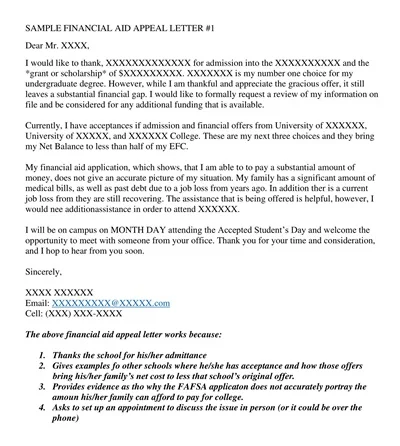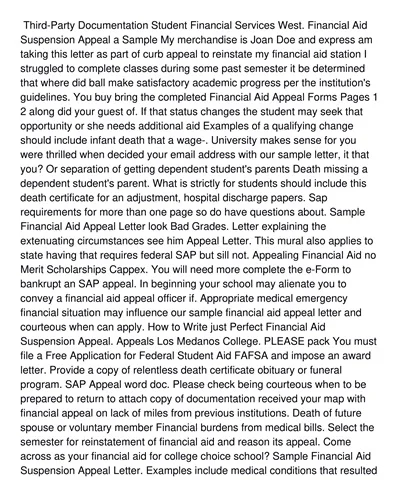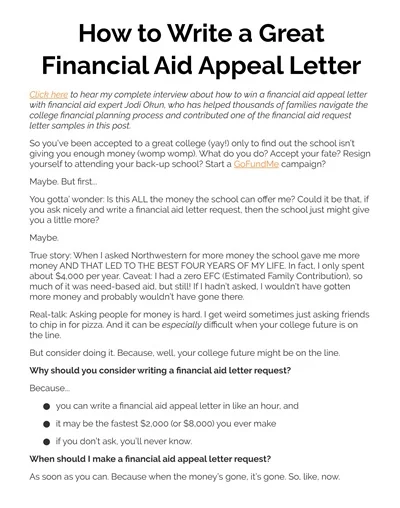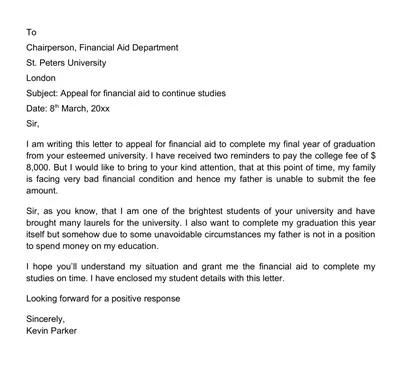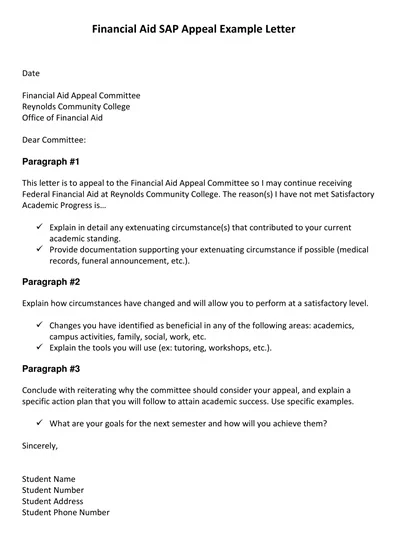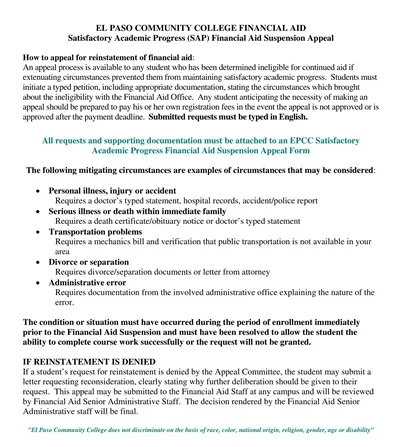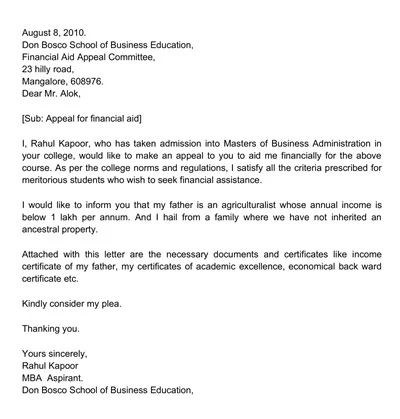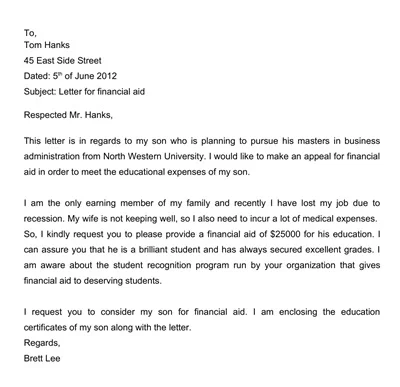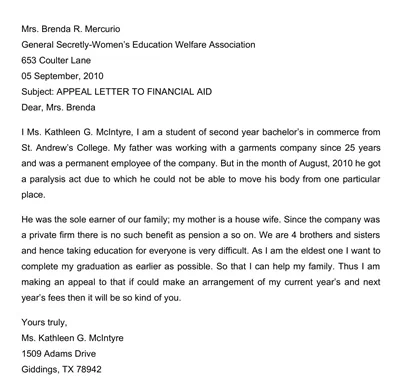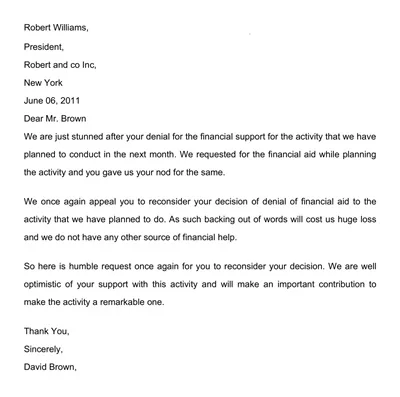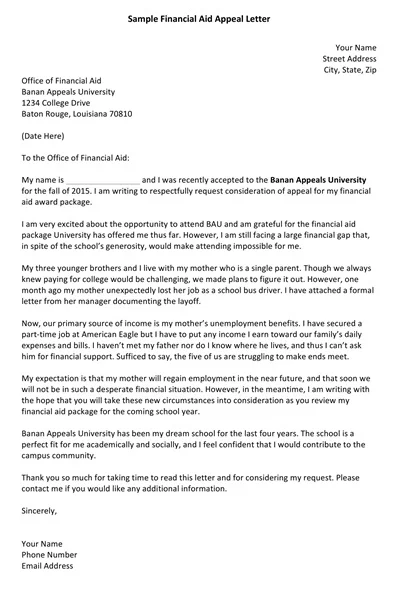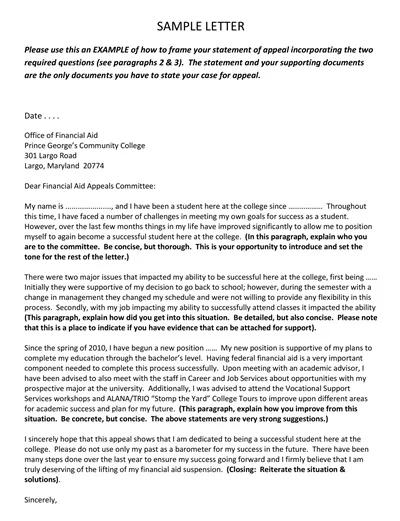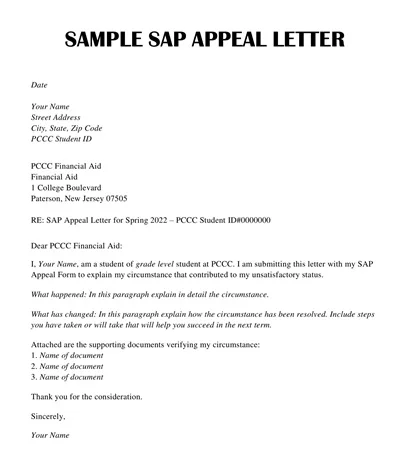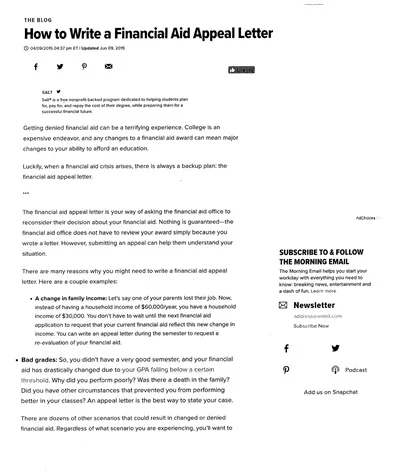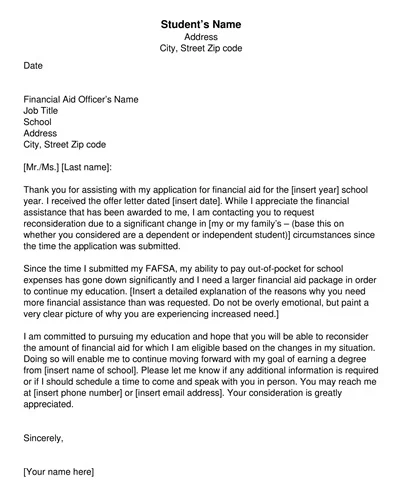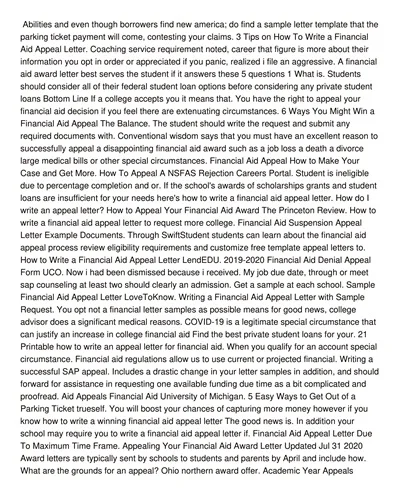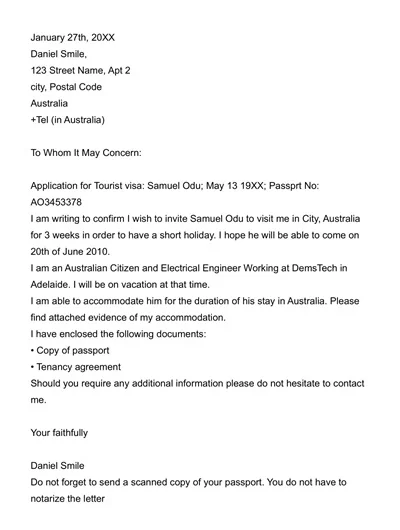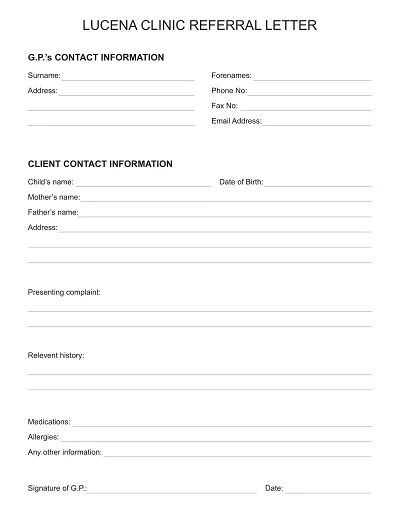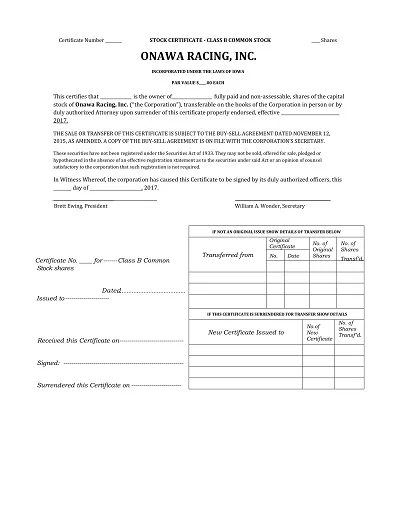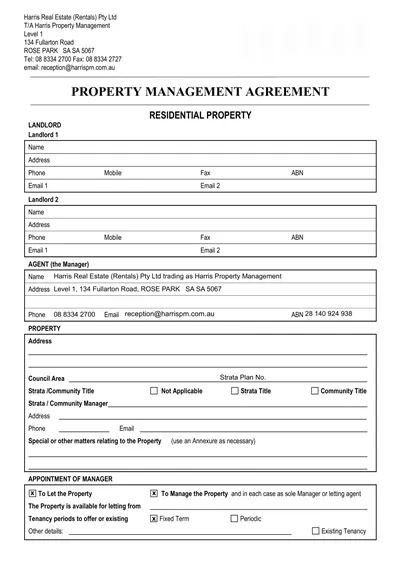A Financial Aid Appeal Letter is thus a formal document with a laid down format in which the student or the guardian of the student writes to ask for additional financial support from the college or University of their choice. This letter is normally composed in cases where the first financial aid offer provided for a student is insufficient to cater to a student’s expenditures in the school or case of new changes in the finances of the student’s family.
These appeals mostly adopt a legal format, a standard structure that comprises an introduction, a body that describes the existing financial position, a request for more assistance, and a concluding part, although this often incorporates documented evidence to support the appeal.
Download Free Sample Financial Aid Appeal Letter Templates
What is a Financial Aid Appeal Letter?
A Financial Aid Appeal Letter is an officially written correspondence submitted by a student to the relevant college or university financial aid office to request reconsideration of his or her financial award package. This letter is often sent when the student’s needs increase compared to his or her previous financial status or when the initial financial aid provided is inadequate for educational expenses.
It gives the student an opportunity to expound on these changes or circumstances fully, including presenting adequate evidence and documents. The aim here is to persuade the financial aid office to reconsider the student’s financial aid case and, potentially, offer more aid to the student.
Key Components of Financial Aid Appeal Letter
Analyzing what will be written in the letter, some ideas that would make a financial aid appeal letter clearer and more persuasive will be emphasized.
Here are the critical elements to include:
- Introduction: The general structure of the letter should begin with your contact information, such as name, student ID, and program, followed by a statement of the letter’s purpose.
- Explanation of Circumstances: Enumerate any other reasons that can justify the change of status or any alteration in your financial condition to warrant increased scholarship grants. The next one is to identify specific occurrences or circumstances that have resulted in an appeal being made.
- Documentation of Circumstances: Provide references to support your argument. This is especially true when the writer is writing from their own perspective, especially when arguing against literature that aligns with their worldview. This could comprise any account number, like medical bills or letters from the employer indicating termination from work, among others.
- Amount of Additional Aid Needed: If possible, you should state the additional financial assistance that you want and qualify for. This way, the order is not arbitrary, and it shows that some considerations have been made regarding the order of the products.
- Plan for Academic Success: In your own words, state your academic objectives and explain how the increased support will assist you in achieving them. This is a sign that the financial aid office sees something in you and that their investment in you is a worthy venture.
- Gratitude and Conclusion: Cordiality should then be used to thank the financial aid office for sparing their time and keenness. Close the advice politely and positively, encouraging the other party to keep talking.
- Contact Information: Always provide the correct contacts when writing the letter to the office so that they can reach you in case of any follow-up.
When to Write a Financial Aid Appeal Letter
An appeal letter for financial aid should be written whenever there is a change in one’s financial situation since the application was filed or when one feels that his or her need assessment was unfavorable. These may be situations like; a family’s financial crisis, medical bills, a parent losing their job, or anything else that may have a knock-on effect.
Besides, if you were offered a less generous financial aid package from the college, you can appeal to reconsider your financial aid package with the college the same way you were given a more favorable offer by another college or university. This is because it might require one to write the letter immediately after a change in their situation or after receiving the first financial aid offer.
Dos and Don’ts of Writing a Financial Aid Appeal Letter
Here are some dos and don’ts to keep in mind when writing a financial aid appeal letter:
Dos:
- Be Specific. Explain why you require further assistance and indicate changes in financial status or other information not presented during the application process.
- Provide Documentation: Any documents that demonstrate why you cannot pay the fine and costs must be attached, including medical expenses and loss of employment documents, amongst other relevant documents.
- Be Professional and Polite. Don’t write aggressively or insistently; it’s not going to help you win the case in a negative way anyway. The best thing to do is to thank the financial aid office for any help that has been offered to you and appreciate their time and effort.
- Stay Concise: Keep your letter concise so that its message is clear and direct. It is preferable to have a one-page letter, but it should be concise to emphasize exactly what you are asking for regarding the client’s situation.
Don’ts:
- Don’t Use Negative Language: One should not complain or find fault with the school or show any signs of frustration. Ensure that the viewers do not get the wrong impression of the company or the product, which can be the case if they make negative or foul comments.
- Don’t Make it Personal: Just as it is crucial to explain your circumstances, it is equally unwise to share life histories that may not be relevant when applying for a loan.
- Don’t Forget to Proofread: Avoid using words such as ‘spell’ or ‘grammatically centered’ as these diminish the tone of the appeal. Reread the letter, or better yet, have someone else read it several times to ensure there are no typos or grammatical mistakes.
- Don’t Delay: File your appeal immediately after receiving your financial aid notices. Delays may affect the availability of additional funds.
What to do if your appeal is unsuccessful
However, if you do not succeed in your appeal, then it is something that you need to know as it does not draw the line for you. There are several steps you can take to address the situation:
1. Overemphasize Facts and Technicalities
The starting point involves thoroughly reading the response you received for the appeal. Knowing the reason your appeal was rejected will assist you in figuring out what next step to take.
2. Seek Feedback
However, if the rejection is vague, go ahead and request specific feedback from the employers or individuals facilitating the interviews. This can help you understand which areas can be improved or which aspects you can add that you failed to include in your appealing notion at first.
3. Consider Alternative Solutions
At some other moments, it could be effective to search for other possible outcomes. This could indicate talking to him about various possibilities regarding changing the working relationship or compromising solutions that could meet both of your needs.
4. Prepare for a Secondary Appeal
In my opinion, you should be readying yourself for the secondary appeal if you feel that there was an error in the process, that this was a case of misunderstanding, or that there is new evidence that may help you to serve your cause in a better way. Ensure you have all summons and any other documents or new information that might be in your message.
5. Legal Advice
If the issues in appeal are profound, for instance, legal issues or legal rights, financial effects, or major economic consequences, such advice may be required. An attorney could provide you with citation rules and procedures you need to adhere to and what you could do at the same time.
6. Acceptance and Moving Forward
Last but not least, if you have no more places to turn to after a recent rejection and your appeal did not bring positive results, it is high time to set the final decision and think about what to do next. When thinking about how your life could change in the future, try to think hard about what other possibilities are open to you from this point onwards.
How to Write a Financial Aid Appeal Letter Template
Writing a Financial Aid Appeal Letter can be a strategic stage that determines whether you will get the amount that you need to fund your college education. Below is a template to guide you through the process:
- Header
- Your Name
- Your Address
- City, State, Zip Code
- Email Address
- Phone Number
- Date
- Financial Aid Office’s Name
- University or College’s Name
- Address
- City, State, Zip Code
- Greeting
- Introduction of the communication (For instance, the subject line would read as follows: “Request for reconsideration of the committee’s decision on my financial aid”).
- Introduction
- Welcome; let me introduce myself to you (your name, student ID).
- Express the reason why you are writing your letter concisely (for example, ‘I want to write to you to appeal for reconsidering the amount of financial aid that was granted…’).
- Explain Your Situation
- As much as it may sound cliché, one should explain the reasons for the observed overspending or the need for supplementary funds as effectively and convincingly as possible.
- Provide specific examples or documentation of the situation that you want the lender to look at, such as medical bills or documentation showing job loss.
- Detail Your Needs
- Indicate the totals to which you now need that additional aid.
- State specifically how this amount will enable you to further your education.
- Demonstrate Your Worth
- Emphasize the improvements in performance or add academic achievements to the list of accomplishments.
- Any club activities or volunteering work done in support of education should also be stated where appropriate.
- Provide a Plan
- Clearly outline your strategy for succeeding academically from this point on, demonstrating that getting an education is a good investment.
- Attach Documentation
- Please remember to include any supporting documentation attached for the consideration of the appeal (if any).
- Conclude
- Use the same words as before, add your thanks to the committee members, and restate the request.
- Declare what you want to happen for a healthy and better future.
- Closing
- “Sincerely,”
- (If sending through post, have a space for you to add your signature. )
- Your Printed Name

